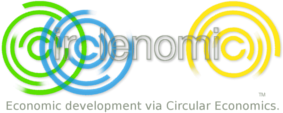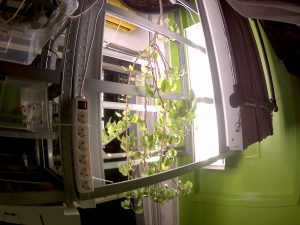Our goal is to raise money through fundraising activities and sales
- Get Circlenomic’s systems fully operational;
- Reproduce successful systems and get grow systems in place;
- Provide technology transfer and support to participants; and
- Encourage the replication of the system with the help of participants.
The reproductive abilities of plants, combined with high-density, Circular, decentralized agriculture, using grow systems such as: Aquaponics, Anthroponics, Organic Hydroponics, Aeroponics and Greywater have infinite potential for economic development.
Employing Circular Economics can greatly decrease cost, increase productivity and clean up the environment. Shifting to Circular thinking can help to see wealth in its other forms.
Aquaponics uses fish effluent to grow plants. The fish are kept in 1000-liter tanks and the nutrient-rich water is pumped over the plant roots. Beneficial bacteria build up in the water that convert the ammonia from fish waste into Nitrogen. The fish can be raised for food or raised as pets and sold for a higher price per fish.
Anthroponics uses human excreta, which can be the back-end of decentralized sewage collection. Feces can be used in 1000 Liter tank based BioGas Digesters. The BioGas can be used for heating and cooking, and the effluent used in Organic Hydroponics. Anthroponics is ideally used to grow non-food crops and can provide the opportunity for entrepreneurship with waste collection, resource and energy production.
Aeroponics grows plants with the plant roots suspended in air. The advantages are low shipping weight and nutrients are readily available, so the plant roots do not have to search for them and struggle against soil to grow. Nasa is pioneering using Aeroponics to grow food on long space missions and grew potatoes in one week.
Reusing water from sinks and water in a Greywater system is best for growing fruit trees and can also present the opportunity for entrepreneurship with Greywater collection. A Greywater system can be on the scale of a city, community or multiple scales of individual. It can be indoors or outdoors, and care must be taken to use only natural cleaners and soap, but the end-result is lots of fruit.
Investing in sustainable agricultural systems that produce resources is a way to stretch the money raised potentially to Infinity. The materials are relatively low cost and growing indoors reduces the system’s vulnerability to outside conditions, allowing for a more reliable platform for economic development.
The systems are sustainable and don’t require continued purchase of plant food. Using fish excreta to grow food and medicine or human excreta to grow non-food plants such as: textiles, bamboo, latex rubber, starch to make bio-plastic, bio-composites and more continues, because the fertilizer is readily available.
The plants themselves can be used or traded directly, or they can be cycled up into more finished retail products, which could be used as samples for larger retailers to seek orders, or they can be exchanged locally, or on the Internet for capital.
These systems offer more possibilities for multiple streams of income and can provide continued income to participants if setbacks occur.





